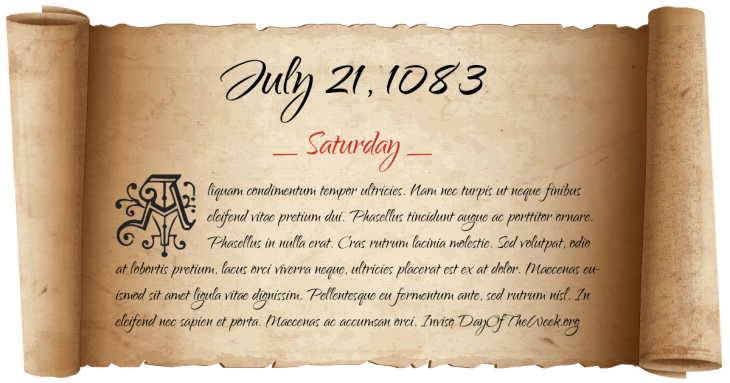
July 21, 1083: Day of the Week
July 21, 1083 was the 202nd day of the year 1083 in the Gregorian calendar. There were 163 days remaining until the end of the year. The day of the week was Saturday.
The day of the week for July 21, 1083 under the old Julian calendar was Friday. Did you notice the difference with the Gregorian calendar?
If you are trying to learn French then this day of the week in French is samedi.
A person born on this day will be 940 years old today. If that same person saved a Half dollar every day starting at age 4, then by now that person has accumulated $171,074.00 today.
![]() Holy Toledo! Did you know that coffee and word games are an excellent combination to sharpen your vocabulary? Let’s give it a quick spin. Within 30 seconds, how many words can you think of from these letters PNILBUMI? Check your answers here: Word scramble PNILBUMI. (Sponsored by WordFinder.Cafe)
Holy Toledo! Did you know that coffee and word games are an excellent combination to sharpen your vocabulary? Let’s give it a quick spin. Within 30 seconds, how many words can you think of from these letters PNILBUMI? Check your answers here: Word scramble PNILBUMI. (Sponsored by WordFinder.Cafe)
Here’s the July 1083 Gregorian calendar. You can also browse the full year monthly 1083 calendar.
![]() Are you not curious to discover some fun facts about your birthday? Find out ‘what happened on my birthday’ and what was the number one song on your day of birth. Know the meaning of your special day and who shares your birthday! (Sponsored link)
Are you not curious to discover some fun facts about your birthday? Find out ‘what happened on my birthday’ and what was the number one song on your day of birth. Know the meaning of your special day and who shares your birthday! (Sponsored link)
Zodiac & Birthstone
Cancer is the zodiac sign of a person born on this day. Ruby is the modern birthstone for this month. Ruby is the mystical birthstone from Tibetan origin that dates back over a thousand years.
Gregorian versus the old Julian calendar
A note to students, teachers, scholars and anyone else passionate about this topic. As stated in the front page, this website is using the Gregorian calendar as the basis for all “day of the week” computation whether or not the Gregorian calendar is relevant for the date in question (July 21, 1083). Educators should point out the primary reason why Pope Gregory XIII introduced a new calendar system in October 1582. That is, to make the computation for the annual date of Easter more accurate since it is the foundation of the Christian faith.
Even with that purpose in mind, the Gregorian calendar too will become out of sync. It has a known approximation error of about one day for every 7,700 years assuming a constant time interval between vernal equinoxes (which is not true). This is better compared to the one day for every 128 years error of the Julian calendar.
![]() Now try another date like anniversaries, birthdays of someone you know or any other date that is special to you. Don’t forget to share the info to your friends, loved ones or social media followers. Who knows, they might appreciate and thank you for it.
Now try another date like anniversaries, birthdays of someone you know or any other date that is special to you. Don’t forget to share the info to your friends, loved ones or social media followers. Who knows, they might appreciate and thank you for it.